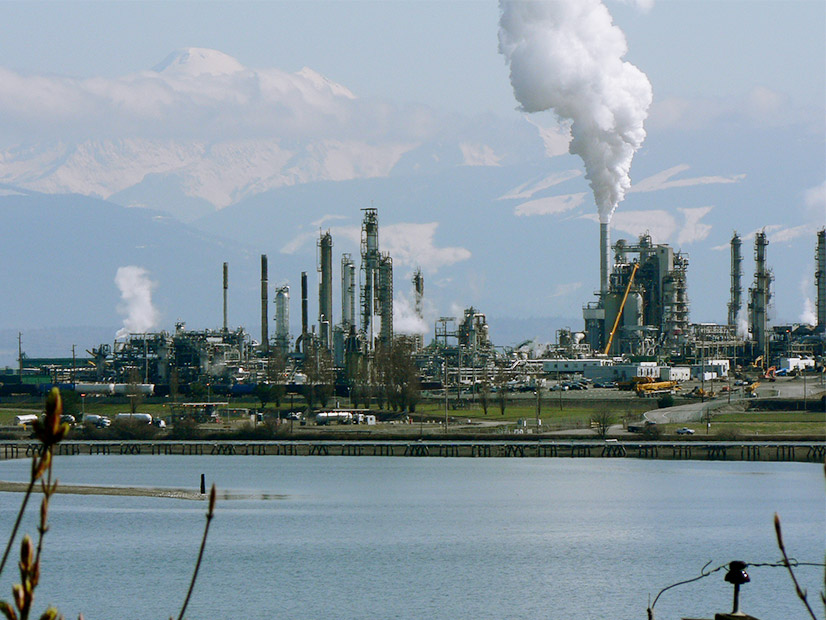Washington’s legislature passed a bill Sunday that will require oil refiners to reduce the carbon content of motor fuels sold within the state.
Both chambers voted on the low-carbon fuel standard bill on the last day of session after a compromise was reached between the two Democratic majorities on Saturday. The state Senate approved the bill 26-23, while the House’s Sunday approval was 54-43 — both votes mostly along party lines. (See Wash. Senate OKs Low-carbon Fuels Bill.)
The bill requires that carbon emissions from gasoline and diesel fuel sold in Washington be cut by 10% below 2017 levels by 2028 and by 20% by 2035. It excludes emissions from fuel that is exported out of state or used by water vessels and railroad locomotives.
The goals apply to overall vehicle emissions in the state and not to individual types of fuels. Northwestern Washington has five oil refineries. The rules go into effect Jan. 1, 2023.
Under the program, biofuels would likely be blended with petroleum-based fuels. State officials have said vehicle emissions account for 42 to 45% of Washington’s carbon pollution. “This addresses the transportation sector — the toughest part of our emissions [problem],” Sen. Reuven Carlyle (D) said.
In both chambers, Democrats and Republicans clashed on what low-carbon fuels will cost at the pump.
Carlyle said Oregon’s low-carbon fuel standard increased the cost of gasoline by 1.8 cents per gallon over the past six years. GOP senators and representatives cited several figures by which they expect low-carbon fuels to increase per gallon gasoline costs by — variously — 21 cents, 28 cents, 60 cents, 75 cents, $1.00 and $2.75.
“We’re just driving up the cost of fuel so the most economically challenged can’t afford it,” Sen. Ann Rivers (R) said.
“You’re putting an unpopular gas tax into a couple good environmental bills,” Rep. Mary Dye (R) said, referring to the LCFS bill and a cap-and-trade bill that passed Saturday with a 5 cents/gallon gasoline tax increase. (See Wash. Becomes 2nd State to Adopt Cap-and-trade.)
Republicans argued that the new low-carbon fuel standard will shrink Washington’s carbon emissions by only 2 to 3%. “People will pay that money to a scheme that has no impact on global benefits,” Rep. Jim Walsh (R) said.
Meanwhile, the bill’s sponsor, Rep. Joe Fitzgibbon (D), said: “This bill lays the foundation for better jobs in rural Washington.”
In the floor debate, Fitzgibbon cited Northwest Advanced Bio-Fuels’ plans to build a jet biofuel plant in Grays Harbor County. He noted the company recently signed a memorandum of understanding with New York City-based Stonepeak Infrastructure Partners for $600 million to finance initial construction of a proposed $1.5 billion biofuels plant. “That’s the kind of jobs this bill supports,” he said. (See Wash. Jet Biofuel Plant Lands $600M Equity Commitment.)
“This [bill] is important for our economic growth with biofuels,” Carlyle said.
“It’ll help us break from foreign oil. … We need to lead on this issue,” added Sen. Derek Stanford (D)
Fitzgibbon’s bill builds on a 2008 law that directed the state to reduce its overall CO2 emissions to 90.5 million metric tons, the level in 1990, by 2020. A recent Washington Department of Ecology report shows that the state’s CO2 emissions dropped to 91.2 MMT by 2012 before growing back to 95.7 MMT in 2017 and 99.57 MMT in 2018. The 2020 level has not yet been calculated.
The same 2008 law sets carbon-reduction targets of 45% below 1990 levels by 2030, 70% by 2040 and 95% by 2050.




